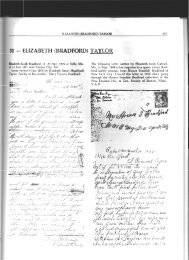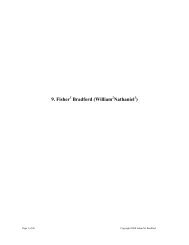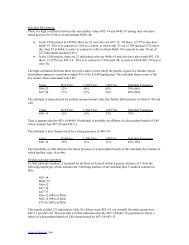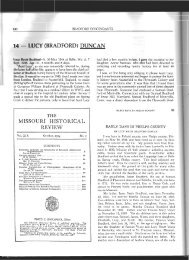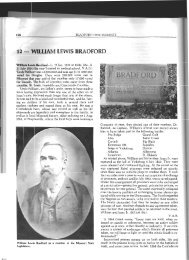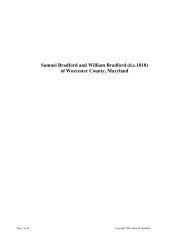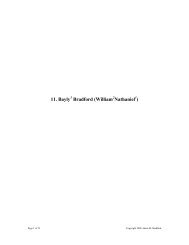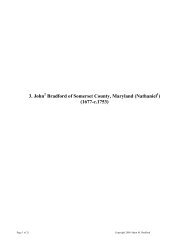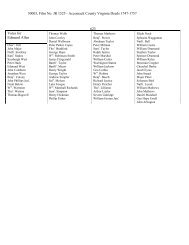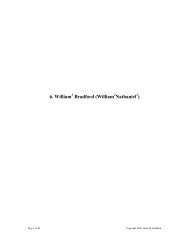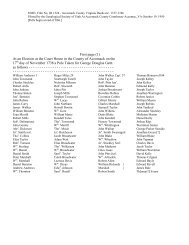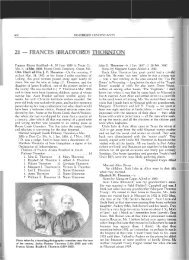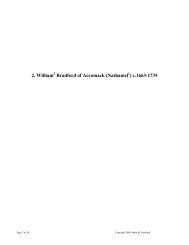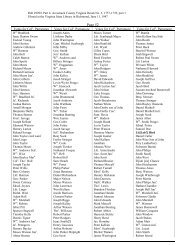1. Nathaniel Bradford of Accomack County, Virginia - Lower ...
1. Nathaniel Bradford of Accomack County, Virginia - Lower ...
1. Nathaniel Bradford of Accomack County, Virginia - Lower ...
You also want an ePaper? Increase the reach of your titles
YUMPU automatically turns print PDFs into web optimized ePapers that Google loves.
In 17 th century <strong>Virginia</strong> slavery was not the primary system <strong>of</strong> labor used in the southern colonies. Though<br />
introduced early in <strong>Virginia</strong>’s history, slavery did not begin to have the permanence <strong>of</strong> an institution guided<br />
by its own laws and special justifications until around 1662, when a <strong>Virginia</strong> law assumed that Africans<br />
would remain servants for life. 217 In the years thereafter the importation <strong>of</strong> Africans increased greatly. 218<br />
But for most <strong>of</strong> <strong>Nathaniel</strong>’s life, slavery had not yet replaced indentured servitude as <strong>Virginia</strong>’s dominant<br />
system <strong>of</strong> labor and the percentage <strong>of</strong> Africans in the labor pool was small compared to what it would<br />
become. 219 For a brief time in the beginning there was also room for ambiguity in the relations between the<br />
Africans and the English, since the entire society was accustomed to varying levels <strong>of</strong> servitude, white or<br />
black. After the expiration <strong>of</strong> their indentures or upon gaining their freedom, a handful <strong>of</strong> Africans even<br />
ended up adopting the <strong>Virginia</strong> planter lifestyle, themselves becoming owners <strong>of</strong> servants and slaves. 220<br />
However, the overwhelming majority <strong>of</strong> Africans in <strong>Virginia</strong> ended up becoming the permanent property <strong>of</strong><br />
Englishmen and by the early 1700s in the public mind a hard distinction had developed between African<br />
slaves and European servants. 221<br />
One record pertaining to <strong>Nathaniel</strong> <strong>Bradford</strong> sheds light on the business <strong>of</strong> the slave trade in 17 th century<br />
<strong>Virginia</strong>. In 1676, <strong>Nathaniel</strong> was sued by Matthew Scarburgh over a verbal bargain the two <strong>of</strong> them had<br />
struck for a black woman. Perhaps the deal had gone badly for <strong>Nathaniel</strong> and he was attempting to get out<br />
<strong>of</strong> it since it had not been in writing. But William Nock had witnessed the bargain and was called upon to<br />
describe it for the court, whereupon a jury found for Scarburgh and ordered <strong>Nathaniel</strong> to pay the full<br />
amount discussed in the bargain:<br />
Deposition <strong>of</strong> Wm. Nock aged about 32 years: About last March 10, Nock was at the house <strong>of</strong><br />
Nath. <strong>Bradford</strong> with Mathew Scarburough when he was asked to witness a bargain between them<br />
concerning a Negro woman for whom <strong>Bradford</strong> was to give Scarburough 3000 lbs <strong>of</strong> tobacco –<br />
half this year and half the next. If three hogsheads would not equal 1500 lbs this year, then<br />
<strong>Bradford</strong> would make it up the next. Scarburgh was to give <strong>Bradford</strong> a bond saving him from<br />
anyone in England or Barbados that might lay claim to the woman. Except for her baptism and the<br />
laws <strong>of</strong> the county, <strong>Bradford</strong> was to have no security; Scarburgh was to give <strong>Bradford</strong> “an<br />
assignment for five years and ever after if he could keep her.” Signed by Wm. Nock, in open court<br />
20 April 1676, before Jno. Washbourne. 222<br />
This record illustrates the sheer ordinariness with which human lives were bargained over in the same way<br />
one bargained over livestock. This was normal in colonial <strong>Virginia</strong> with respect to white servants as well,<br />
with the important difference that for an African it was not a term <strong>of</strong> years but an entire lifetime for which<br />
they could be sold. Even the longest-bound <strong>of</strong> white servants were allowed their freedom at some point in<br />
their lives, assuming a variety <strong>of</strong> obligations had been fulfilled. The most extreme cases <strong>of</strong> prolonged white<br />
servitude were the bastard children <strong>of</strong> servants – these children essentially became the property <strong>of</strong> the<br />
mother’s master, and did not gain their freedom until they reached the age <strong>of</strong> 2<strong>1.</strong> 223 In that respect the legal<br />
status <strong>of</strong> a white bastard was not appreciably different from a bastard <strong>of</strong> mixed race, provided the mother<br />
was white. Other white servants were sometimes forced to remain in servitude for longer than their original<br />
contract due to a variety <strong>of</strong> reasons – e.g., as penalties for attempted escapes, because their master or<br />
mistress paid a fine for them, or due to other indebtedness– but even these men and women only had their<br />
independence postponed. For African slaves there was no hope <strong>of</strong> independence except through escape or<br />
by the whim <strong>of</strong> their owner.<br />
* * * * *<br />
Henry <strong>Bradford</strong><br />
In 1676, <strong>Nathaniel</strong>’s servant John Reeves petitioned for his freedom. <strong>Nathaniel</strong> had purchased Reeves as an<br />
indentured servant from a Henry <strong>Bradford</strong>, and in a deposition before the court on 18 July 1676 Joseph<br />
Thorne related that, while at the house <strong>of</strong> Robt. Hutchinson on 25 March <strong>of</strong> that year, he heard Henry<br />
<strong>Bradford</strong> say to Reeves: “[I] brought [you] in for the term <strong>of</strong> four years and no more and had sold [you] but<br />
for four years and no longer should serve, and if Nath. <strong>Bradford</strong> had an assignment from [me] for any<br />
longer time, [I] will give him his ear.” 224<br />
<strong>Nathaniel</strong>, who claimed another year <strong>of</strong> service from Reeves, was instead forced to let him go, paying him<br />
600 lbs tobacco for extra time served as well as the bushel <strong>of</strong> corn and suit <strong>of</strong> clothes customarily given to<br />
servants upon the expiration <strong>of</strong> their indenture. 225 Apart from the details it contains, this record is also<br />
Page 39 <strong>of</strong> 74 Copyright 2008 Adam M. <strong>Bradford</strong>



